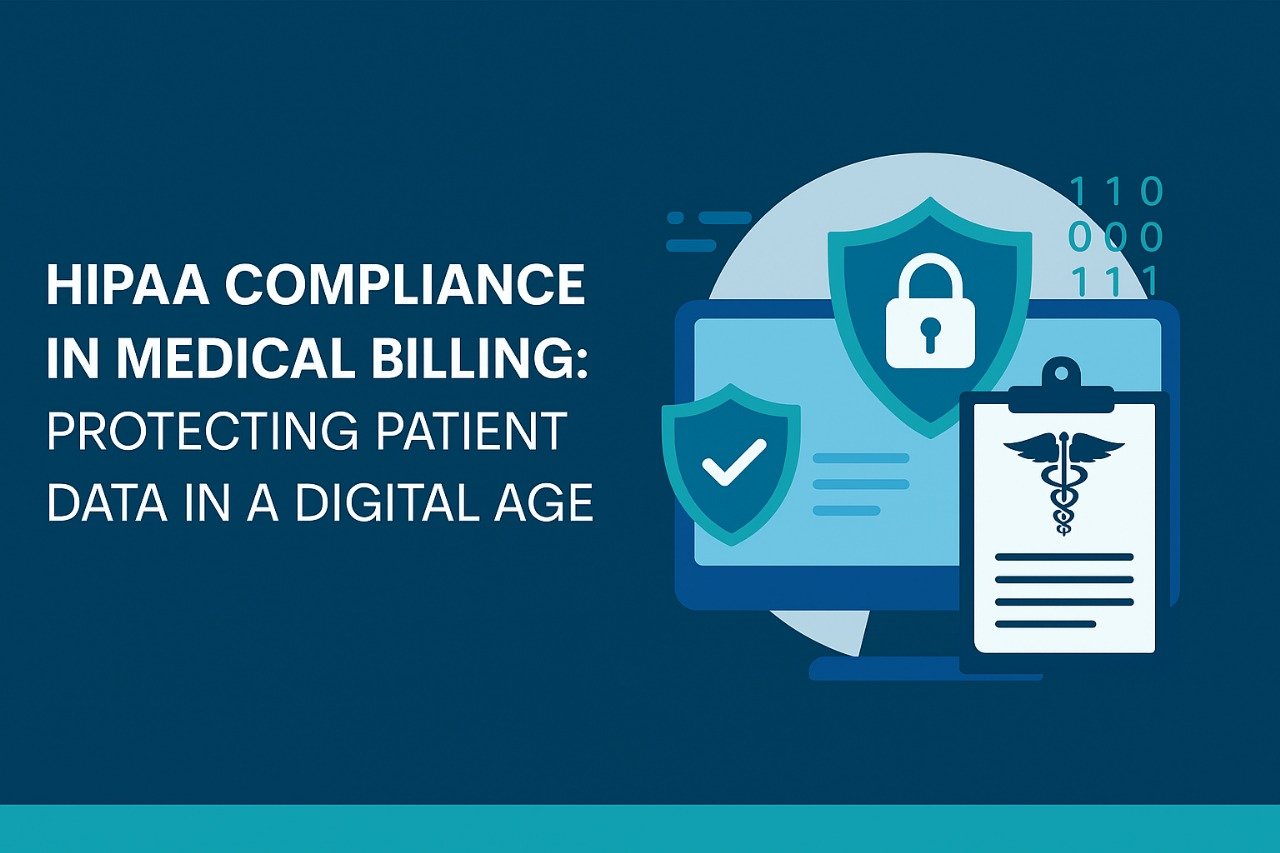
In today’s healthcare environment, data breaches are a growing concern—especially in medical billing, where sensitive patient information is handled daily. The Health Insurance Portability and Accountability Act (HIPAA) sets the national standard for safeguarding protected health information (PHI), and its implications extend directly into how medical billing operations are conducted.
Whether you manage billing in-house or work with a third-party provider, HIPAA-compliant billing practices are not optional—they are a legal and ethical necessity. In this blog, we’ll explore what HIPAA compliance means in the context of medical billing, strategies for ensuring patient data security in billing, and the importance of ongoing HIPAA training for billing staff.
What is HIPAA, and Why Is It Critical in Billing?
Enacted in 1996, HIPAA was originally designed to protect health insurance coverage for workers. Over the years, it evolved to address privacy, security, and electronic transaction standards in healthcare. The law mandates that healthcare providers, insurance payers, and business associates (including billing companies) must safeguard the privacy and integrity of patient data.
The HIPAA Privacy Rule regulates the use and disclosure of PHI, while the HIPAA Security Rule focuses on protecting electronic PHI (ePHI) through administrative, physical, and technical safeguards.
Medical billing processes—from claim submission and eligibility checks to payment posting and patient collections—involve direct access to PHI, making HIPAA compliance vital at every step.
What Are HIPAA-Compliant Billing Practices?
HIPAA-compliant billing practices refer to procedures and systems that follow the guidelines set out in HIPAA’s Privacy and Security Rules. These practices aim to protect PHI from unauthorized access, disclosure, or alteration.
Here are essential elements of HIPAA-compliant billing:
1. Secure Data Storage
All patient billing data, whether stored in the cloud or on-premises, must be encrypted and protected using secure access controls, including passwords and multi-factor authentication.
2. Audit Trails
Billing systems should log all access to patient data—tracking who accessed what information and when. This provides accountability and aids investigations in case of breaches.
3. Minimum Necessary Rule
Only the information needed to perform a specific billing function should be accessed or shared. For example, front-office staff don’t need full clinical records to confirm patient insurance.
4. Business Associate Agreements (BAAs)
If you’re outsourcing billing, your provider must sign a BAA, confirming their obligation to maintain HIPAA standards.
5. Timely Breach Notification
Under HIPAA, covered entities must report breaches affecting 500 or more individuals to the U.S. Department of Health and Human Services (HHS) within 60 days.
Ensuring Patient Data Security in Billing
Data security isn’t just about technology—it’s about building a culture of protection and accountability. Here’s how practices can proactively focus on ensuring patient data security in billing:
a. Encrypt All Electronic Communications
Whether submitting a claim, emailing a patient about their bill, or working with an outsourced partner, use secure, encrypted channels to protect PHI.
b. Limit Physical Access
Keep paper records locked in secure cabinets. Ensure that only authorized staff have access to billing files and systems. Avoid storing login credentials in open or shared areas.
c. Update Billing Software Regularly
Use billing platforms that are HIPAA-compliant and updated regularly to protect against vulnerabilities and cyber threats.
d. Perform Regular Risk Assessments
Evaluate your billing systems and practices at least annually to identify vulnerabilities. HIPAA requires covered entities to assess risks and document their mitigation strategies.
e. Dispose of Data Securely
When paper or electronic records are no longer needed, dispose of them using HIPAA-approved methods, such as shredding or digital wiping.
HIPAA Training for Billing Staff
Even the most advanced billing system can’t prevent a breach caused by human error. That’s why HIPAA training for billing staff is essential to maintaining compliance and patient trust.
What Should Training Include?
- Understanding PHI
Teach staff to identify what constitutes PHI and when it can legally be shared. - Recognizing Breach Risks
Train staff to detect phishing emails, suspicious access attempts, and unsafe communication methods. - Secure Handling of ePHI
Emphasize password protection, screen-locking policies, and the use of encrypted systems. - Incident Reporting
Make sure all staff know the process for reporting a suspected breach or compliance violation. - Ongoing Refresher Courses
HIPAA training should be part of onboarding, but it must also be repeated annually to reflect rule changes and technology updates.
Pro Tip: Document all training sessions, attendance, and materials to demonstrate compliance in the event of an audit.
Real Consequences for Non-Compliance
HIPAA violations are taken seriously, and fines can be steep. According to the HHS Office for Civil Rights (OCR), penalties range from $100 to $50,000 per violation, with a maximum annual fine of $1.5 million per type of violation.
Some notable penalties have occurred due to lax billing processes, such as:
- Unencrypted billing emails sent to patients
- Unauthorized access to billing records by staff
- Failure to report a breach within the mandatory timeline
Beyond financial losses, HIPAA breaches damage reputation, disrupt operations, and reduce patient trust.
How E Billing Providers Ensures HIPAA-Compliant Billing
At E Billing Providers (EBP), HIPAA compliance is at the core of everything we do. Our team is trained in HIPAA-compliant billing practices, and we use secure platforms to protect your patients’ data from start to finish. Whether it’s claim submission, denial management, or patient billing, we ensure every step follows the highest standards for privacy and security.
We offer:
- Encrypted claim submissions and data transfers
- Strict access controls and audit trails
- Regular internal audits and risk assessments
- HIPAA-certified billing staff and coders
- Signed Business Associate Agreements for all clients
If your current billing process isn’t HIPAA-optimized, you could be at risk. Let EBP help you build a secure and compliant revenue cycle.
📞 (619) 493-3926 | 📧 info@ebproviders.com
🌐 www.ebproviders.com
📅 Book a free consultation: ebproviders.com/book-now
Protecting Patient Data—That’s Our Promise.



